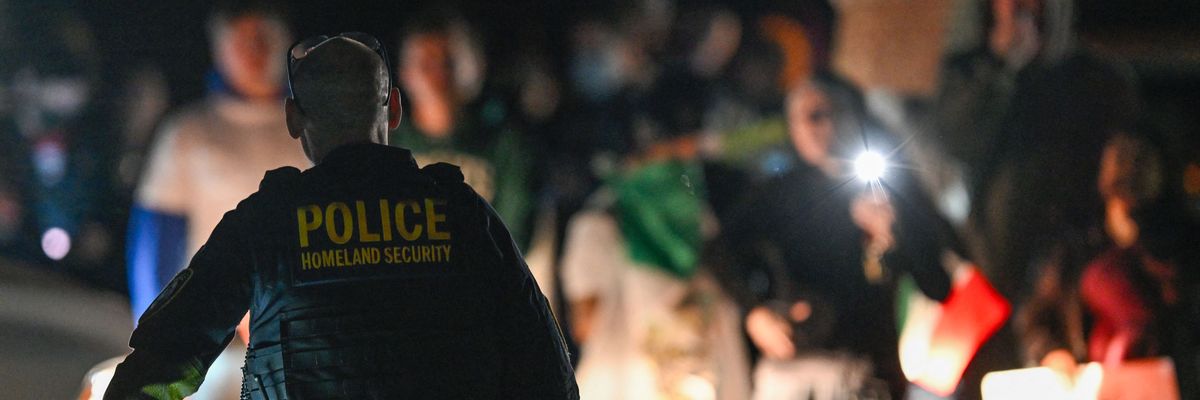In the past few months, the Trump administration has intensified its assault on political dissent. The September 25 release of National Security Presidential Memorandum 7, titled “Countering Domestic Terrorism and Organized Political Violence,” capitalized upon the shooting death of Turning Point USA leader Charlie Kirk and marked an alarming escalation in the regime’s suppression of political dissent in the name of national security.
The NSPM-7 memorandum casts a wide net by identifying a wide swath of previously protected criticisms of American policy, capitalism, Christian nationalism, and fascism as potential threats to US security. This language reveals the government’s effort to construct a political category of terrorism so broad that it can encompass nearly any form of progressive or left-aligned civil society work.
The intensifying campaign now unfolding against progressive movements in the United States did not arise overnight. It reflects an expansion of strategies that have been enacted since some of the country’s earliest days, with historical precedents in the US government’s attacks on anti-slavery movements, Civil Rights organizations, workers’ rights movements, and anti-war activists. NSPM-7 presents itself as a decisive response to domestic extremism, but in reality, it repurposes long-standing tools of state surveillance and criminalization, and directs them toward a broader range of political actors. By framing a wide spectrum of views that challenge the administration as potential state threats, it merges national security logic with partisan hostility.
The administration’s recent designation of several European anti-fascist groups as global terrorist entities, along with its earlier attack on the Palestinian civil society groups Al-Haq, the Palestinian Centre for Human Rights (PCHR), and Al-Mezan, fits squarely into this same trajectory. It signals an effort to construct a transnational narrative in which resistance to authoritarian politics is reinterpreted as a form of organized danger to US security. This new global framing reinforces the domestic one. Together, they redefine dissent as a matter for preemptive national security intervention rather than as a form of democratic disagreement.
NSPM-7 does not establish new criminal prohibitions. It instead reorganizes existing authorities in order to expand their reach to subvert political dissent.
The approach embedded in NSPM-7 was foreshadowed in Project Esther, an October 2024 document by the Heritage Foundation that outlined the very methods now being enacted through federal authority. Presented as a plan to combat antisemitism, it has instead served as a justification for coordinated attempts to weaken civil society groups, especially those connected to Palestinian solidarity work. Jewish Voice for Peace, for example, appears prominently in Project Esther. The project treats dissenting Jewish movements as potential enemies of the state while ignoring the sources of real antisemitic violence from white supremacist organizations and Trump’s own network. In doing so, it advances an agenda that uses the language of Jewish protection to mask a campaign that targets, among many groups, Jewish progressives and anti-fascists.
NSPM-7 does not establish new criminal prohibitions. It instead reorganizes existing authorities in order to expand their reach to subvert political dissent. The most troubling aspect is the encouragement to intervene before any political act occurs. This “pre-crime” approach draws directly from earlier post-9/11counterterrorism practices that targeted Arab, Muslim, and Palestinian communities on the basis of suspicion rather than action. Those attacks produced widespread surveillance, infiltration, and community fear, and in doing so made the public less safe. The new Trump memo now positions those same strategies to be used against a much wider segment of civil society. Anyone associated with advocacy for Palestinian rights, critiques of US foreign policy, challenges to state violence, or left-aligned social movements is a potential target.
Historical parallels offer important context. Under National Socialist rule, Germany relied on security language to arrest, imprison, and murder political opponents. Italy and Spain under fascist regimes treated labor groups, social movements, and minority activists as subjects for surveillance, detention, and execution. The United States has its own history of using national security claims to silence and even execute dissenters during the Cold War. In each case, the crucial step was the transformation of political disagreement into a threat to national security.
As a scholar of modern Jewish history and Holocaust studies, I view the current moment in part through these historical precedents. The misuse of claims about protecting Jews while weaponizing antisemitic accusations against figures such as Zohran Mamdani and George Soros demonstrates that anti-Jewish hatred is not being confronted as a social prejudice but instrumentalized in support of a racist, authoritarian regime. The effect is to direct state power against those who participate in movements for justice and equality. This undermines genuine efforts to confront all manifestations of bigotry and oppression and weakens democratic life.
There is, however, another dimension to this history. Communities that endured earlier waves of repressive counterterrorism policy also developed strategies of collective defense and political resilience. What is required at this moment is recognition of the scale and coherence of the strategy being deployed. ICE raids, the false designation of peaceful Palestinian human rights groups as terrorist organizations, to attacks on transgender people—these should not be viewed in isolation. They are components of a coordinated effort to curtail the activity of civil society. The appropriate response begins with solidarity across movements, a clear understanding of the racial and political foundations of these policies, and, most of all, a refusal to allow this expansion of state power to become normalized.
The administration’s actions demand a collective defense of democratic spaces. The lessons of the past are clear: attacks on our civic freedom can be resisted, but only when communities recognize the stakes and act together. This moment requires precisely that resolve.




